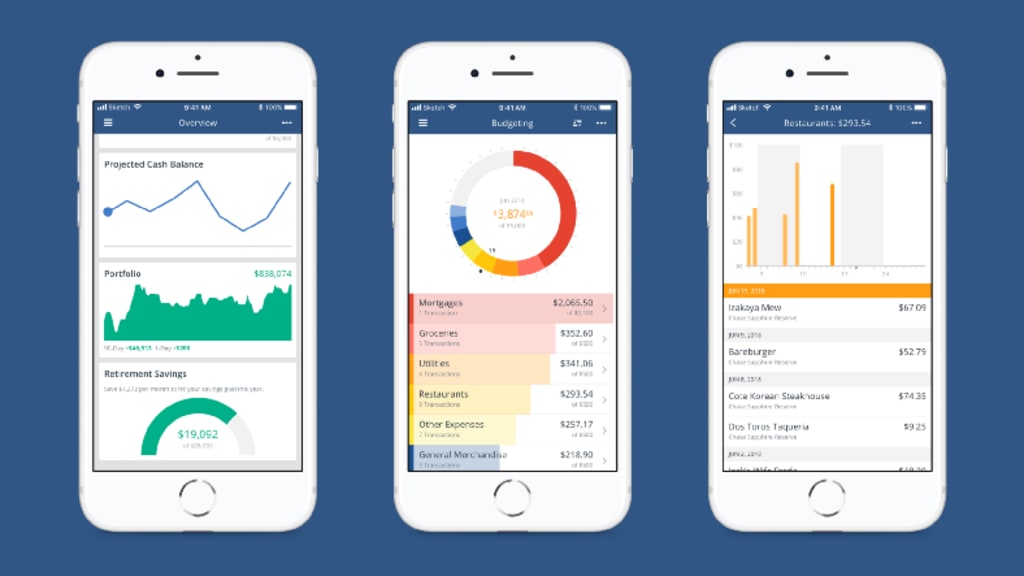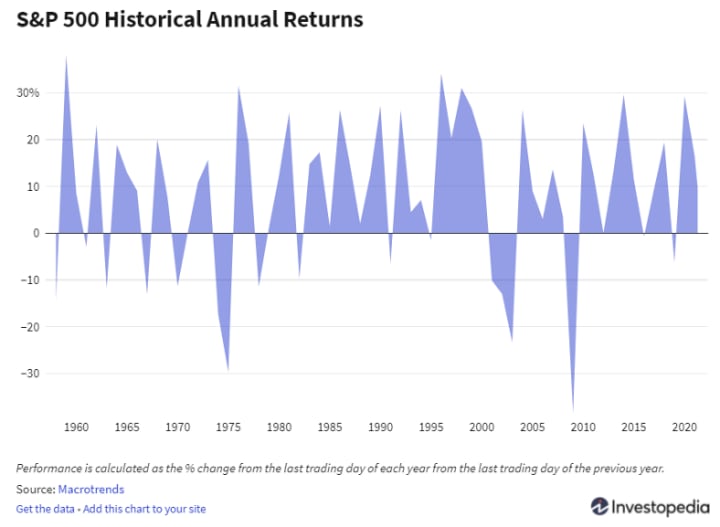
Life does not move in a straight line, which means everything from your net worth, to your investments, to your retirement plan, will likely experience a setback at some point. This could be in the form of loss of employment, unexpected expenses, unexpected medical bills, etc.
One of the hardest parts about preparing for your future and retirement is thinking about life as a 70-something. It’s pretty daunting and a lot of people feel overwhelmed about saving for an unknown future, hence they end up not saving anything at all. Thankfully, planning for retirement is not overly onerous. However, you will still need a roadmap plan in plan in place if you want to set yourself up for a comfortable life ahead and an easy retirement.
Investment options to consider for your portfolio
Portfolio:
- Stocks
- Bonds
- ETF, Mutual funds, Index funds
- Alternative investments
- Real estate
- Business income
1. Stock
The thing about stocks is that most people buy them through an ETF, mutual fund or index fund. Some may buy individual stocks of a company as well.
- The S&P 500 Index with 90 stock holdings since its inception in 1926 through 2018 has an approximate rate of return of 10%–11%.
- The average annual return since adopting 500 stocks into the index in 1957 through 2018 is roughly 8%.
If you invest in the stock market in your 20’s and held your investments until the retirement age of 65 your investments would have most likely increased in value over the 40 years.
However, the downside is that the stock market can go up and down. Below is a graph of the S&P 500 historical returns from Investopedia.

In 2008, stock prices dropped by more than 35%. Similarly, this was the case as well when the Covid-19 pandemic hit in 2020.
S&P 500 takeaway:
- The index has returned an annualized average return of around 10% since its inception through 2019.
- It is a benchmark on the benchmark of American stock market performance, since 1920.
2. Bonds
A bond is a popular investment option for savers. It is less volatile than the stock market. At the end of that bond’s term, you get back your original investment and interest.
Types of bonds include:
- Corporate bonds- These are issued by companies.
- Municipal bonds- These are issued by states and municipalities
- Government bonds- These are issued by the U.S. Treasury
- Agency bonds- These are government-affiliated organizations
- Foreign bonds- These are issued by foreign companies.
Bonds are attractive in the sense that it has very little risk of default, increased security especially if it's raised by the federal government. Investing in bonds is relatively straightforward and the bondholder just needs to buy the bond and hold the bond to maturity and they will get the principal back plus interest. Additionally, there is a profit to be made if you sell the bond at a higher price than when you bought it.
The downside is that bonds usually have a lower return than stocks, companies can default on bonds, and bond yields can fall. If you need to sell your bond before the maturity date and yields climb, you’ll have to sell it for a lower price than you bought it for
3. ETF, Mutual funds, Index funds
Mutual funds, index funds and ETF’s essentially hold a basket of funds with a diversified portfolio to mitigate the risk of over-reliance on a particular stock or entity.
There are a few distinct characteristics in which they differ for eg, expense ratio, no. of trades processed in a day, liquidity, the way the investment is managed, etc.
Mutual funds are ideal for people who don’t want to choose individual stocks. Instead, a professional fund manager can do it for you. Some of the mutual funds you can consider are VTSAX and VTFIAX.
Index funds are similar to active mutual funds, except there’s no stock picker. These funds track a benchmark index, like the S&P 500 or the broad-based MSCI World Index.
For ETFs, they are like traditional mutual funds in that they hold a basket of securities, like stocks or bonds, and they’re like index funds in that many tracks a benchmark. They’re different, though, in that they trade on a stock exchange, which means they’re priced in real-time and can be bought and sold at any point during the day. Some of the ETF’s that you might want to consider is VOO and VTI.
4. Alternative investments
Alternative investments could include investments from real estate, hedge fund investing, precious metals, fine art, peer-to-peer lending, cryptocurrency, etc. It could also include private equity deals and venture capital deals.
The thing to note is that alternative investments are not conventional investments, hence the term “alternative” investment. The alternative doesn’t mean it’s a bad thing or less lucrative it just means that it’s a different path to potentially increase wealth given the nature of these alternative investments.
The thing about these alternative investments is that they have this allure and charm to them. It attracts particularly high-net-worth individuals who have a special interest in a particular tangible asset or investment opportunity that they believe can turn into a valuable investment. And while some alternative investment opportunities may have higher barriers to entry and higher risk, it has the potential for higher payout and can be a hedge against your investment portfolio.
5. Real estate
For real estate, you can generate rental income if you rent your property or use it as an Airbnb.
For real estate investing, you can invest in:
1. Physical property- Owning rental properties can be a great opportunity for individuals to generate consistent income and have capital appreciation on an asset that they own. The thing to consider though is the upfront cost needed to own a property.
2. Real estate investment trust(REIT)- REIT is buying shares in real estate investment trusts (REIT), which invest in companies that finance or run commercial properties. Publicly traded REITs through an online broker may be an option for investors that do not have a large upfront capital and want to have easy access to their funds. In addition, to qualify as a REIT, it must pay 90% of its income back to its investors.
3. House flipping- Flippers usually buy a property to sell it later within a few months, and sell it for a profit.
4. Real estate investment groups- A simple way to think of a real estate investment group is as a mutual fund for rental properties. A company will buy or build a set of buildings, often apartments, then allow investors to buy them through the company, thus joining the group.
5. Online real estate platform- These online platforms connect investors who are looking to finance projects with real estate developers. Investments are usually performed over online real estate crowdfunding.
6. Business income
Business income could take many different types of shapes and forms. For example, you may own your brick and mortar store or an e-commerce store. You may even own your own online freelancing photography business or website design business.
Business income usually takes a huge upfront time, energy and sometimes capital to launch but once it gains traction, then it can be passive in the sense that you aren’t laboriously struggling for each online sale or dollar that the business brings in.
It is about finding ways to monetise your skillset and something that you are passionate about. It could be blogging, copywriting, videography, creating and selling physical products, doing podcasts, advertising, generating leads etc. The list is endless.
Conclusion
At the end of the day, the goal is to achieve wealth accumulation. The higher the rate of return the better it is for your investment portfolio. Having control of your investment portfolio provides clarity and stability in launching you forward in your wealth creation.
Knowing how wealth becomes concentrated is one of the most powerful reasons to save more and that’s the best way to have your capital working for you.
----------------------------------------------------------------------------------------
If you would like to support my writing, please consider liking my story, subscribing, pledging and/or tipping. Thank you for reading!






Comments
There are no comments for this story
Be the first to respond and start the conversation.